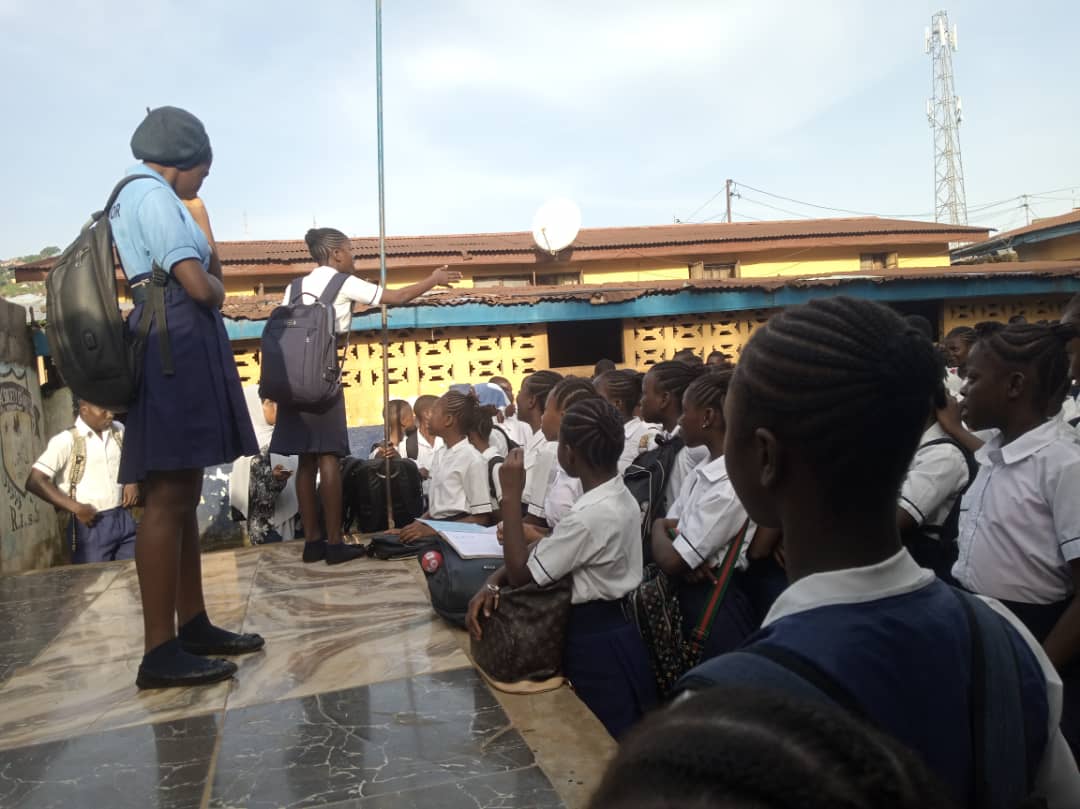By Lemuella Tarawallie
UNICEF–Sierra Leone, in collaboration with Girl Child Network-Sierra Leone, on Tuesday held a Menstrual Hygiene Assembly Talk with pupils of the Raheem Junior Secondary Islamic School at the east end of Freetown.
The aim of the Assembly Talk was to sensitize both girls and boys of the Raheem Islamic Junior Secondary School about menstruation and menstrual hygiene management.
During the Menstrual Hygiene Assembly Talk the Field Officer at the Girl Child Network-Sierra Leone, Ann Marie Bongay, said prior to the Assembly Talk, UNICEF had educated and trained girls and boys on menstruation and menstruation hygiene management and that those “girls and boys are now serving as Peer Mentors in their various schools”.
She added that the Assemble Talk was very important as it would help many girls to be cautious of their personal hygiene and for them to take very good care of themselves during their menstruation. “Some girls do not even know what is menstruation but through some sessions we have had with them, they have really learnt a lot”, she noted.
Ann Marie Bongay continued that with such sensitizations and pads availability in many schools, it would help a lot of girls and that it would help reduce the high numbers of absentees among girls during their menstruation period.
She disclosed that for this year, “the Girl Child Network-Sierra Leone and UNICEF have worked with 32 schools which have lots of girls”. She added that as a Field Officer for Girl Child Network-Sierra Leone working with UNICEF, they were going from school to school targeting Primary and Junior Secondary Schools in wharf communities in Freetown.
Ann Marie Bongay thanked UNICEF-Sierra Leone for coming to their, pledging that with UNICEF’s continued support their Network would be able to even reach hard-to-reach areas countrywide.
Umunatu Rahman Fofanah, one of the female Peer Mentors at the Raheem Islamic Junior Secondary, during the Assembly Talk said, “as a girl when you’re in your period, you should be able to take care of yourself, you should bath three times a day”.
She told her companions that “as a girl, when you are in your menstrual period you should not be shy to talk to your Peer Mentors in your school, you should be able to talk to them whenever you encounter difficulties during your period. And to the boys, they should understand that menstruation is a natural thing God created in girls so they should not mock them when they are on their period”.
She added that before this time, when there were no menstrual hygiene sensitization such as the one the Girl Child Network-Sierra Leone was now doing; girls played truancy because when they happened to see their period during school hours they felt ashamed, and whenever they noticed that they were having period-pains they stayed away from school.
Ibrahim H. Thorlie, a JSS2 pupil of the Raheem Islamic Secondary who was a beneficiary of the Menstruation Assembly Talk in a exclusive interview, said “this Menstruation Assembly Talk is beneficial to me as a boy because back then when they talked about menstruation, men and boys were exempted from that topic. But today, the world has been modernised and now boys are included in menstruation discussions”.
Elizabeth James, a JSS3 pupil, said from what was said during the Menstrual Hygiene Assembly Talk, she now knew that “when a girl is on her period she needs to change her pads regularly as pads are now available in schools”.
She thanked UNICEF and Girl Child Network-Sierra Leone for what they had done for her, because they supplied her pads during her period.


